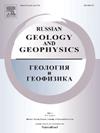Artificial Neural Network-Based Computational Algorithm of Inverse Sumudu Transform Applied to Surface Transient Electromagnetic Sounding Method
IF 1
4区 地球科学
Q3 GEOSCIENCES, MULTIDISCIPLINARY
引用次数: 0
Abstract
––The paper discusses the results of the development of a deep learning-based algorithm of the inverse Sumudu transform applied to the problem of on-ground non-stationary electromagnetic sounding. The Sumudu transform has potential for solving forward geoelectric problems in three-dimensional earth models because, unlike using the Laplace or Fourier transform, the Sumudu image of a real function is also a real function. Thus, there is no need to use complex numbers in subsequent calculations, which reduces computational costs and memory requirements in case of successful determination of the Sumudu image of the function. The disadvantages of the approach include the absence of an explicit method for calculating the inverse transform. The inversion can be done by solving the corresponding Fredholm integral equation of the first kind, but this is a poorly conditioned task leading to high requirements for the accuracy of the Sumudu image. The use of modern machine learning techniques can provide a method that is more robust to noise in the input data. This paper describes the process of creating a training dataset and developing a neural network algorithm; we evaluate the accuracy and performance of the obtained solution. The proposed method can contribute to the development of new approaches to physical processes modeling as well as to analysis, processing and interpretation of measured geophysical data.基于人工神经网络的反苏木杜变换计算算法在地表瞬态电磁探测法中的应用
--本文讨论了基于深度学习的反苏木杜变换算法应用于地面非稳态电磁探测问题的开发成果。苏木杜变换在解决三维地球模型中的前向地电问题方面具有潜力,因为与使用拉普拉斯或傅里叶变换不同,实函数的苏木杜图像也是实函数。因此,在后续计算中无需使用复数,从而在成功确定函数的苏木杜图像的情况下降低了计算成本和内存要求。这种方法的缺点是缺乏计算逆变换的明确方法。反变换可以通过求解相应的弗雷德霍姆第一类积分方程来完成,但这是一项条件较差的任务,因此对苏木杜图像的精度要求很高。使用现代机器学习技术可以提供一种对输入数据中的噪声更稳健的方法。本文介绍了创建训练数据集和开发神经网络算法的过程,并对所获解决方案的准确性和性能进行了评估。所提出的方法有助于开发物理过程建模以及分析、处理和解释地球物理测量数据的新方法。
本文章由计算机程序翻译,如有差异,请以英文原文为准。
求助全文
约1分钟内获得全文
求助全文
来源期刊

Russian Geology and Geophysics
地学-地球科学综合
CiteScore
2.00
自引率
18.20%
发文量
95
审稿时长
4-8 weeks
期刊介绍:
The journal publishes original reports of theoretical and methodological nature in the fields of geology, geophysics, and geochemistry, which contain data on composition and structure of the Earth''s crust and mantle, describes processes of formation and general regularities of commercial mineral occurrences, investigations on development and application of geological-geophysical methods for their revealing. As to works of regional nature, accelerated publication are available for original papers on a variety of problems of comparative geology taking into account specific character of Siberia, adjacent Asian countries and water areas. The journal will also publish reviews, critical articles, chronicle of the most important scientific events, and advertisements.
 求助内容:
求助内容: 应助结果提醒方式:
应助结果提醒方式:


